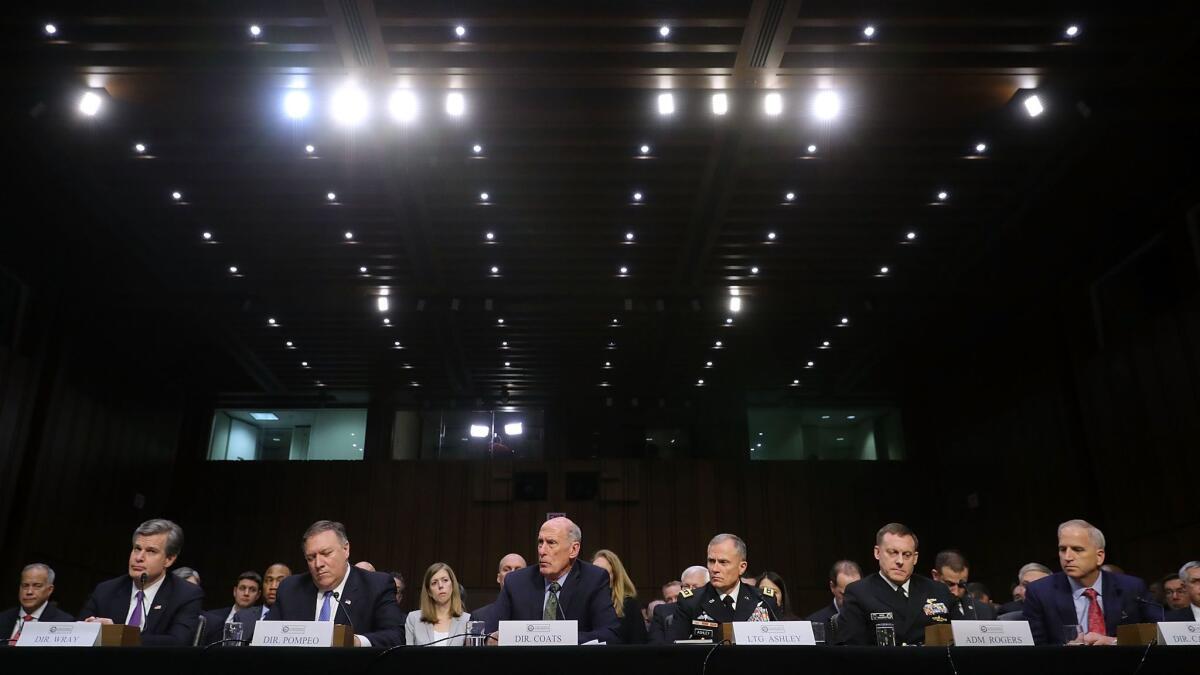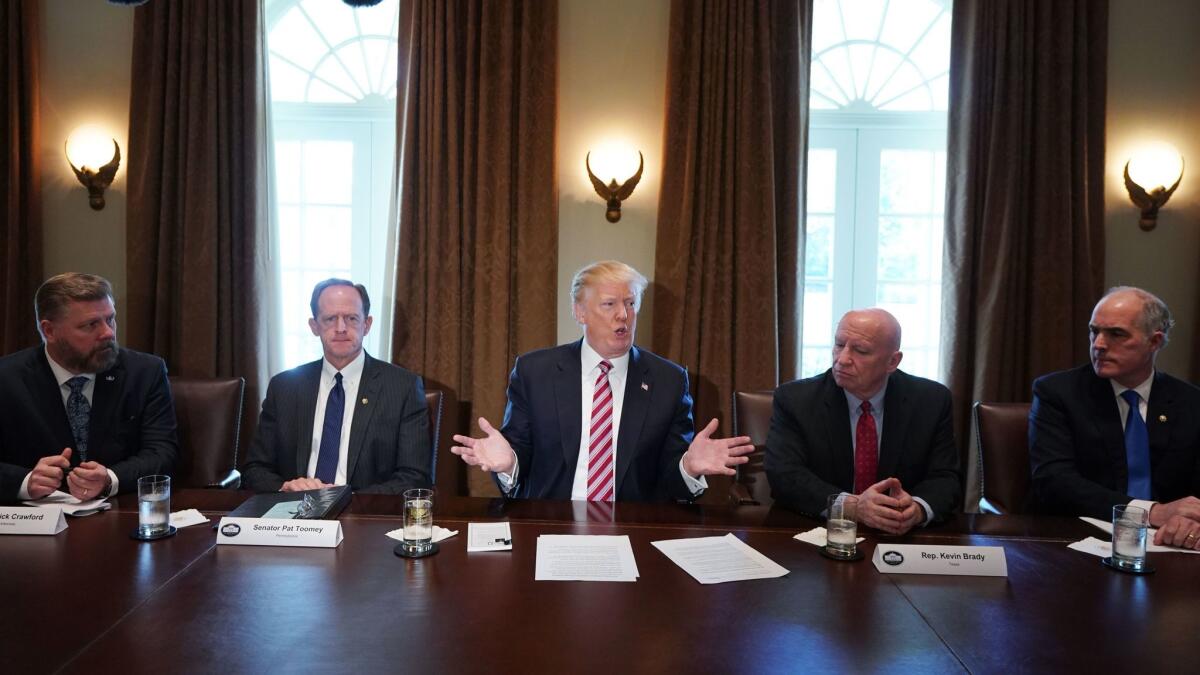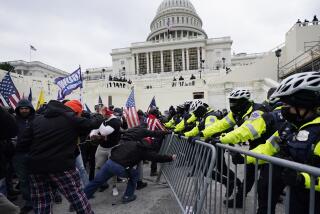For Trump’s national security team, addressing the threats means ignoring the tweets

Reporting from Washington — Sitting side by side at a long, black-draped table, six U.S. intelligence chiefs all sounded the same alarm — Russian meddling in U.S. politics didn’t stop after the 2016 presidential race and could get worse in this year’s midterm elections.
It was a striking display of unanimity and one that left President Trump at odds — again — with his own hand-picked national security team.
Trump has downplayed and even denied Russian meddling in the U.S. election, which he largely portrays as a Democratic hoax meant to delegitimize his victory, leaving the nation’s spy services straining to prevent a repeat performance in November.
“This is the largest gap I have ever seen between the urgency of the intelligence community and the response of the chief executive,” said Michael Hayden, who headed the CIA and the National Security Agency under President George W. Bush.
Hayden said it will be hard to adequately address Russian political interference without presidential direction because the issue requires a coordinated response.
“You need emphasis, resources and restructuring — energized from the presidential level,” he said.
Leon E. Panetta, who served as CIA director and secretary of Defense under President Obama, and as chief of staff to President Clinton, said U.S. intelligence officials seem determined to press forward despite disinterest from the White House.
“The national security team is trying to keep the country focused on the key threats that are out there whether or not the president agrees or disagrees,” Panetta said. “I think their hope is that if they keep pressing on the importance of these threats from Russia that at some point the president will follow.”
Panetta said that’s not how the process is supposed to work on sensitive national security issues. Pushback normally happens inside the National Security Council, not in public.
“In any other administration that I’ve been a part of … having somebody out there contradict the president would be unacceptable,” he said.

At the Senate hearing Tuesday, Dan Coats, director of national intelligence; Mike Pompeo, head of the CIA; Christopher A. Wray, the FBI director; and three other intelligence chiefs challenged or contradicted White House claims involving Russia, a declassified Republican memo about surveillance, and the security review for a senior Trump aide forced out on domestic violence allegations.
They are hardly alone. Secretary of State Rex Tillerson, who travels the world in perpetual damage control mode, last week explained part of the disconnect during a visit to the Middle East. “The president’s tweets don’t define the policy,” he said.
Secretary of Defense James N. Mattis felt compelled to tamp down fears of military conflict with North Korea last August after Trump tweeted, “Talking is not the answer!” The Pentagon chief publicly disagreed, saying, “We’re never out of diplomatic solutions.”
Gordon Adams, a professor emeritus at American University’s School of International Service, said it’s increasingly hard to figure out who is addressing the range of threats facing America.
“The incoherence, the inconsistency, the persistent disconnect is quite unprecedented,” Adams said.
The dispute over Russian meddling is the most glaring. During the Senate hearing, the spy chiefs struggled to answer when Sen. Jack Reed (D-R.I.) asked whether Trump had given specific orders to blunt Russian interference in the fall campaign — or had put anyone in charge of coordinating a response.
“We’re taking a lot of specific efforts,” said Wray, the FBI director.
“Directed by the president?” Reed pressed.
“Not as specifically directed by the president,” Wray conceded.
Reed then asked Pompeo whether the president had “singled out the Russian threat, which appears to be critical to this election coming up.”
Trump has asked the agency to “do everything we can to ensure that we thoroughly understand this potential threat,” the CIA director responded.
Follow live coverage of the Trump administration on Essential Washington »
Michael Beschloss, a presidential historian, described the episode as “something we haven’t seen in modern history.”
After foreign attacks, Beschloss said, “you usually see presidents pretty aroused and pretty eager to make sure it doesn’t happen again.”
Trump has tussled with U.S. spy chiefs since his election and the release several weeks later of a declassified intelligence community report that concluded groups backed by Russian intelligence had hacked Democratic Party emails and used social media in an operation aimed at undermining U.S. democracy and helping Trump beat Hillary Clinton.
After months of deriding the reports as ginned up by Democrats, Trump said he believed Russian President Vladimir Putin’s denial of any Moscow role after they met last November. Facing a subsequent outcry from Democrats and Republicans, Trump said he accepted the U.S. intelligence assessment.
“I’m with our agencies, especially as currently constituted with their leadership,” he said. “I believe in our intelligence agencies. I’ve worked with them very strongly.”
Special counsel Robert S. Mueller III is leading a criminal investigation into whether anyone from Trump’s orbit assisted Russian attempts to interfere with the 2016 campaign. The president has denied any collusion, and his allies have tried to brush off questions about what kind of impact Moscow may have had.
On Wednesday, Vice President Mike Pence said that “it is the universal conclusion of our intelligence communities that none of those efforts had any impact on the outcome of the 2016 election.”
But that’s not what intelligence officials concluded. “We did not make an assessment of the impact that Russian activities had on the outcome of the 2016 election,” said the report released shortly before Trump’s inauguration.
Some of the most dramatic clashes have occurred between Trump and the FBI, even after the president fired James B. Comey as director last May and appointed Wray as a replacement.
When House Republicans prepared a classified memo that alleged abuse by FBI and Justice Department officials seeking a surveillance warrant, Trump quickly declassified the memo and said it “vindicated” him.
At the Senate hearing Tuesday, Wray did not agree, repeating an FBI statement that the bureau had “grave concerns” about the memo’s accuracy.
Wray also contradicted the White House account of why Rob Porter continued to work as Trump’s staff secretary after his two ex-wives told the FBI that Porter had been violent with them — accusations backed by photos, a police report and a judge’s restraining order.
That sparked another round of finger-pointing at the White House as to who knew what when about problems with Porter’s security clearance, widening the scandal.
Kathleen Hicks, senior vice president at the nonpartisan Center for Strategic and International Studies and a former Defense Department official, said it’s clear that the lack of coherence from the Trump administration is not a phase that will end.
“The big downside is people can’t really count on what you say or do,” she said. “There are all these different messages coming out.”
Times staff writer Noah Bierman contributed to this report.
Twitter: @chrismegerian
ALSO
As foreign hackers plot next attack, Washington struggles to shore up vulnerable voting systems
More to Read
Get the L.A. Times Politics newsletter
Deeply reported insights into legislation, politics and policy from Sacramento, Washington and beyond. In your inbox three times per week.
You may occasionally receive promotional content from the Los Angeles Times.











